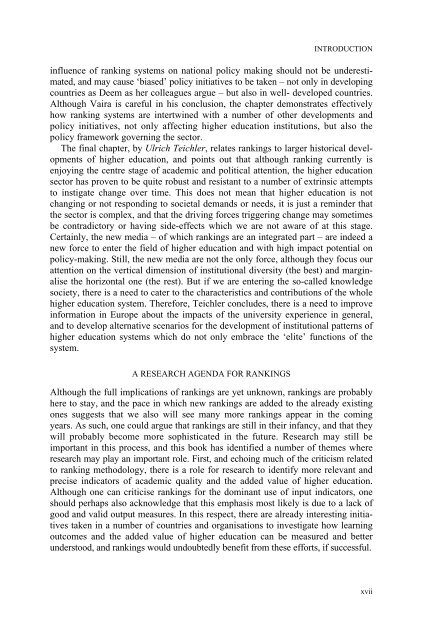University Rankings, Diversity, and the New ... - Sense Publishers
University Rankings, Diversity, and the New ... - Sense Publishers
University Rankings, Diversity, and the New ... - Sense Publishers
Create successful ePaper yourself
Turn your PDF publications into a flip-book with our unique Google optimized e-Paper software.
INTRODUCTION<br />
influence of ranking systems on national policy making should not be underestimated,<br />
<strong>and</strong> may cause ‘biased’ policy initiatives to be taken – not only in developing<br />
countries as Deem as her colleagues argue – but also in well- developed countries.<br />
Although Vaira is careful in his conclusion, <strong>the</strong> chapter demonstrates effectively<br />
how ranking systems are intertwined with a number of o<strong>the</strong>r developments <strong>and</strong><br />
policy initiatives, not only affecting higher education institutions, but also <strong>the</strong><br />
policy framework governing <strong>the</strong> sector.<br />
The final chapter, by Ulrich Teichler, relates rankings to larger historical developments<br />
of higher education, <strong>and</strong> points out that although ranking currently is<br />
enjoying <strong>the</strong> centre stage of academic <strong>and</strong> political attention, <strong>the</strong> higher education<br />
sector has proven to be quite robust <strong>and</strong> resistant to a number of extrinsic attempts<br />
to instigate change over time. This does not mean that higher education is not<br />
changing or not responding to societal dem<strong>and</strong>s or needs, it is just a reminder that<br />
<strong>the</strong> sector is complex, <strong>and</strong> that <strong>the</strong> driving forces triggering change may sometimes<br />
be contradictory or having side-effects which we are not aware of at this stage.<br />
Certainly, <strong>the</strong> new media – of which rankings are an integrated part – are indeed a<br />
new force to enter <strong>the</strong> field of higher education <strong>and</strong> with high impact potential on<br />
policy-making. Still, <strong>the</strong> new media are not <strong>the</strong> only force, although <strong>the</strong>y focus our<br />
attention on <strong>the</strong> vertical dimension of institutional diversity (<strong>the</strong> best) <strong>and</strong> marginalise<br />
<strong>the</strong> horizontal one (<strong>the</strong> rest). But if we are entering <strong>the</strong> so-called knowledge<br />
society, <strong>the</strong>re is a need to cater to <strong>the</strong> characteristics <strong>and</strong> contributions of <strong>the</strong> whole<br />
higher education system. Therefore, Teichler concludes, <strong>the</strong>re is a need to improve<br />
information in Europe about <strong>the</strong> impacts of <strong>the</strong> university experience in general,<br />
<strong>and</strong> to develop alternative scenarios for <strong>the</strong> development of institutional patterns of<br />
higher education systems which do not only embrace <strong>the</strong> ‘elite’ functions of <strong>the</strong><br />
system.<br />
A RESEARCH AGENDA FOR RANKINGS<br />
Although <strong>the</strong> full implications of rankings are yet unknown, rankings are probably<br />
here to stay, <strong>and</strong> <strong>the</strong> pace in which new rankings are added to <strong>the</strong> already existing<br />
ones suggests that we also will see many more rankings appear in <strong>the</strong> coming<br />
years. As such, one could argue that rankings are still in <strong>the</strong>ir infancy, <strong>and</strong> that <strong>the</strong>y<br />
will probably become more sophisticated in <strong>the</strong> future. Research may still be<br />
important in this process, <strong>and</strong> this book has identified a number of <strong>the</strong>mes where<br />
research may play an important role. First, <strong>and</strong> echoing much of <strong>the</strong> criticism related<br />
to ranking methodology, <strong>the</strong>re is a role for research to identify more relevant <strong>and</strong><br />
precise indicators of academic quality <strong>and</strong> <strong>the</strong> added value of higher education.<br />
Although one can criticise rankings for <strong>the</strong> dominant use of input indicators, one<br />
should perhaps also acknowledge that this emphasis most likely is due to a lack of<br />
good <strong>and</strong> valid output measures. In this respect, <strong>the</strong>re are already interesting initiatives<br />
taken in a number of countries <strong>and</strong> organisations to investigate how learning<br />
outcomes <strong>and</strong> <strong>the</strong> added value of higher education can be measured <strong>and</strong> better<br />
understood, <strong>and</strong> rankings would undoubtedly benefit from <strong>the</strong>se efforts, if successful.<br />
xvii














